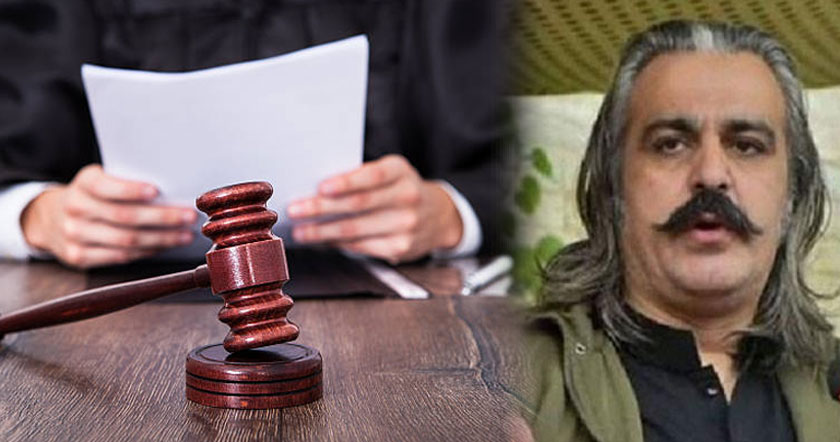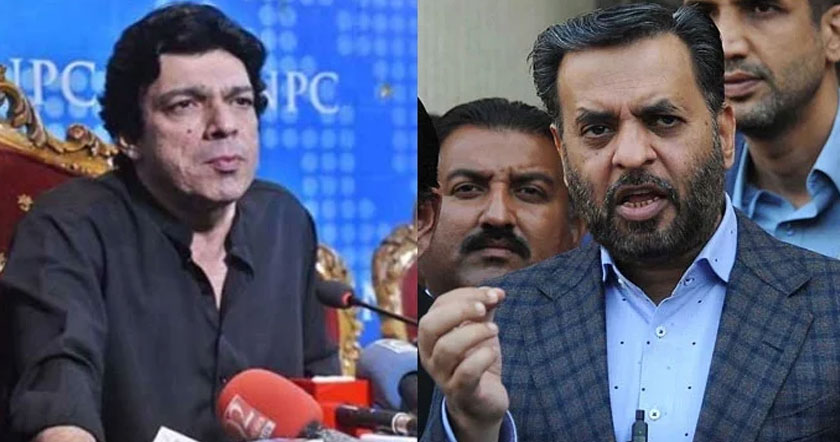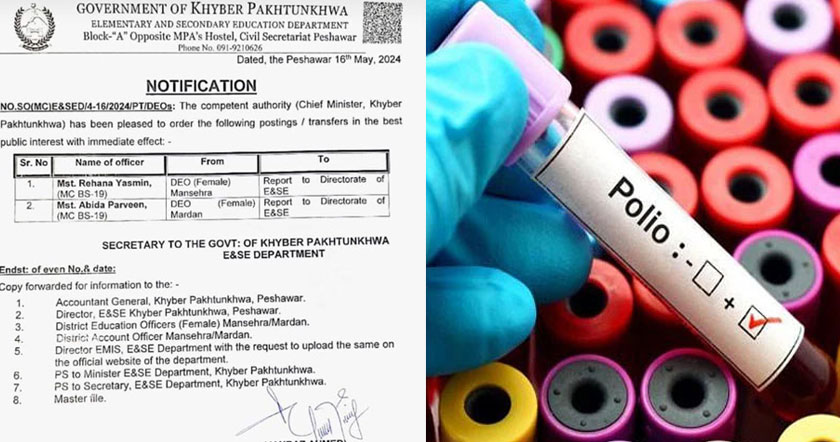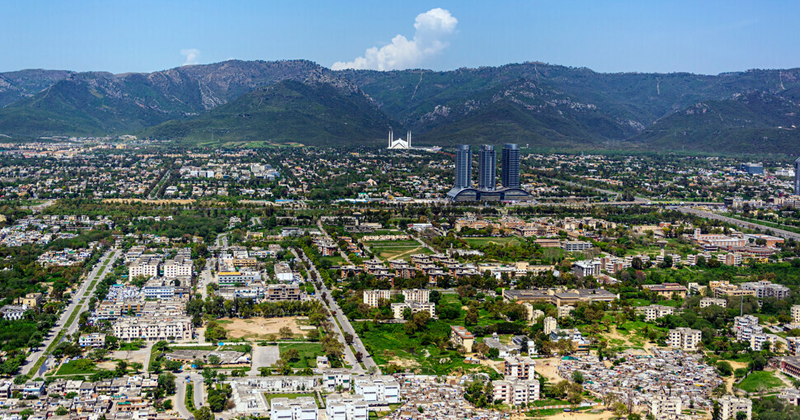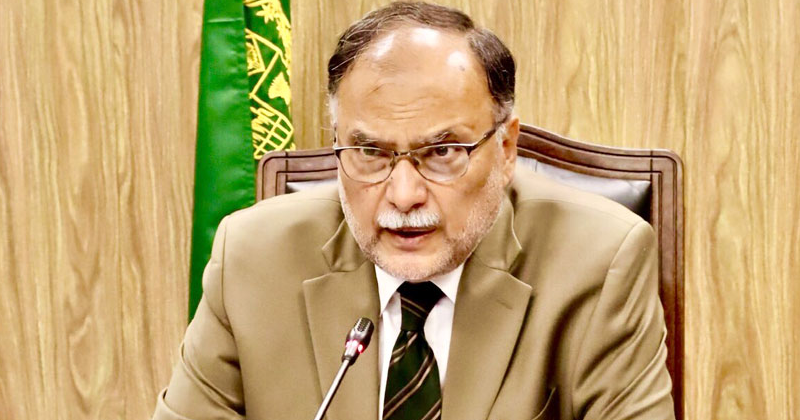The secular Mussalman
Khaled Ahmed
On September 24, 1948, after the demise of Quaid-e-Azam Mohamed Ali Jinnah, his sister Fatima Jinnah and Prime Minister Liaquat Ali Khan submitted a joint petition at the Karachi High Court describing Jinnah as a `Shia Khoja Mohamedan' and praying that his will be disposed of under Shia inheritance law. On February 6, 1968, after Mohtarma Fatima Jinnah's demise, her sister Shirin Bai moved an application claiming Fatima Jinnah's property under Shia inheritance law because the deceased was a Shia.
On 29 October 1970, one Hussain Ali Gangji Walji filed a suit against Shirin Bai, seeking to prove that Fatima Jinnah was in fact a Sunni, as was Jinnah, and that therefore Shirin Bai was entitled to only half the inheritance under Sunni law, the other half going to the agnate relations, that is, to the offspring of Fatima Jinnah's paternal uncle. Hussain Ali was the son of Gangji Walji, the son of Walji Poonja, Jinnah's paternal uncle.
Hussain Ali deposed that he was himself an Ismaili Shia and not anIsna-Ashari Shia. According to witness Syed Sharifuddin Pirzada, Jinnah broke from the Ismail faith in 1901 after his two sisters, Rehmat Bai and Maryam Bai, married into Sunni Muslim families. It appears that this happened because the Ismail community objected to these marriages. Also, the conversion of Isna-Ashari Shiism happened in Jinnah's immediate family, and not in the families of his two paternal uncles, Walji and Nathoo.
The case also revealed that Shirin Bai, Jinnah's other sister, too did not convert to Isna-Ashari Shiism. Possibly, she could not because her husband Jafferbhoy was an Ismaili. She left Bombay after Fatima Jinnah's death in 1967 and came to Karachi. She embraced Shiism in order to qualify for the inheritance of Fatima Jinnah under Shia law. So only the Quaid and Fatima Jinnah had abandoned the Ismaili faith. Both carefully avoided a sectarian label. Both said they were neither Shia nor Sunni, but `Mussalman'. The Quaid was at pains to gather the Muslims of India under the banner ofa general Muslim faith and not under a divisive sectarian identity.
Of Jinnah's four sisters, two married into Sunni families, but their offspring were not all Sunni. The depositions in the legal record published by Liaquat H. Merchant in his book Jinnah: A Judicial Verdict reveal that two grand-daughters of Jinnah's sister Maryam Bai, who married into a Sunni family, retained the Shia faith. Merchant, appointed by the Sindh High Court as Administrator of the Estate of the Quaid-e-Azam, is a civil lawyer in Karachi. He is the grandson of Maryam Bai, wife of Abedin Peerbhai, a Sunni. His mother Sher Bano, married to Habib Hoosain Merchant, was Maryam Bai's daughter.
The legal record is silent on Jinnah's brother Ahmed Ali. It is not clarified whether he was buried in a Sunni, Shia or Ismaili graveyard in Bombay. Merchant has kindly informed the writer that Ahmed Ali's daughter Fatima Goepfert lives in Switzerland. She had married a non-Muslim. Jinnah's daughter, Dina Wadia, a US resident, alsomarried a non-Muslim.
The leading witnesses to appear for Shirin Bai in 1968 were I.H. Ispahani, a family friend of the Quaid and his honorary secretary in 1936, and Matloobul Hassan Syed, his private secretary from 1940 to 1944. Ispahani revealed that Jinnah had told him in 1936 that he and his family had converted to Shiism after his return from England in 1894. He said that Jinnah had married Ruttie Bai by Shia ritual. He however conceded that Jinnah was opposed in the Bombay elections by a Shia Conference candidate. Ispahani was present when Fatima Jinnah died in 1967. He arranged her ghusl and janaza at Mohatta Palace according to Shia ritual. Her Sunni namaz-e-janaza was held later at the Polo Ground, after which she was buried next to the Quaid. Ritualistic Shia talqin (last advice to the deceased) was done after her body was lowered into the grave. (Jinnah had arranged for talqin for Ruttie Bai too when she died in 1929).
Matloobul Hassan Syed deposed that FatimaJinnah's faith became clear to him when he accompanied her to Mardan in the NWFP in her election campaign against General Ayub Khan. When local Shia leaders told her that they would vote for Ayub, she contended that she could represent them better as she was a Shia. Syed's biography of Jinnah, which appeared in 1945, is still rated as the best account of his political career to be written by a Pakistani.
Witness Syed Anisul Husnain, a Shia scholar, deposed that he had arranged the ghusl of the Quaid. He led his namaz-e-janaza in a room of the Governor-General's House at which Yusuf Haroon, Hashim Raza and Aftab Hatim Alvi were present, while Liaquat Ali Khan waited outside. After the Shia ritual, Maulana Shabbir Anmad Usmani, an alim of the Deoband school, known for its anti-Shia beliefs, read his janaza according to the Sunni ritual. Witnesses confirmed that after the demise of Fatima Jinnah, alam and panja (Shia symbols) were discovered from her residence, MohattaPalace.
Justice Abdul Qadir Shaikh delivered the first judgment on February 24, 1970, rejecting Fatima Jinnah's affidavit (co-signed by Liaquat Ali Khan) that the Quaid was a Shia. He found that his secular Muslim faith made him neither Shia nor Sunni. Justice Zafar Husain Mirza delivered the second judgment on December 23, 1976, striking down the Walji petition. It went to the High Court Bench of Chief Justice Abdul Hayee Kureshi. On December 23, 1984, it reversed the earlier judgements and maintained that while the Quaid was definitely not a Shia, the issue of Fatima Jinnah's persuasion was open to inquiry.
In 1965, Fatima Jinnah had moved from the Quaid's residence, Flagstaff House, to Mohatta Palace, an evacuee property she acquired in exchange for the Quaid's Bombay house. After her death, Shirin Bai moved in. After her death in 1980, a trust created by her took over, but was proceeded against by the Waljis and the Palace became deserted. In 1993, Sindh Governor Mehmood Haroon moved the High Court tosell Mohatta Palace to his government. The Rs 61.8 million it paid the court is still contested by the heirs.
Liaquat H. Merchant, himself a descendant of the Jinnah-Poonja clan, puts it thus in his book: `From the legal record, it becomes clear that the Court was inclined to repose more trust in the avowed non-sectarian public stance of the Quaid and his sister. Because of the Muslim law of succession and its either/or verdict, the sectarian question had to be considered. It is perhaps in order that the judicial verdict was finally inconclusive: the Quaid was not a Shia; he was also not a Sunni, he was simply a Muslim.
The writer is a noted Pakistani journalist. This article first appeared in `The Friday Times' (Lahore) where he is a columnist.
Khaled Ahmed
On September 24, 1948, after the demise of Quaid-e-Azam Mohamed Ali Jinnah, his sister Fatima Jinnah and Prime Minister Liaquat Ali Khan submitted a joint petition at the Karachi High Court describing Jinnah as a `Shia Khoja Mohamedan' and praying that his will be disposed of under Shia inheritance law. On February 6, 1968, after Mohtarma Fatima Jinnah's demise, her sister Shirin Bai moved an application claiming Fatima Jinnah's property under Shia inheritance law because the deceased was a Shia.
On 29 October 1970, one Hussain Ali Gangji Walji filed a suit against Shirin Bai, seeking to prove that Fatima Jinnah was in fact a Sunni, as was Jinnah, and that therefore Shirin Bai was entitled to only half the inheritance under Sunni law, the other half going to the agnate relations, that is, to the offspring of Fatima Jinnah's paternal uncle. Hussain Ali was the son of Gangji Walji, the son of Walji Poonja, Jinnah's paternal uncle.
Hussain Ali deposed that he was himself an Ismaili Shia and not anIsna-Ashari Shia. According to witness Syed Sharifuddin Pirzada, Jinnah broke from the Ismail faith in 1901 after his two sisters, Rehmat Bai and Maryam Bai, married into Sunni Muslim families. It appears that this happened because the Ismail community objected to these marriages. Also, the conversion of Isna-Ashari Shiism happened in Jinnah's immediate family, and not in the families of his two paternal uncles, Walji and Nathoo.
The case also revealed that Shirin Bai, Jinnah's other sister, too did not convert to Isna-Ashari Shiism. Possibly, she could not because her husband Jafferbhoy was an Ismaili. She left Bombay after Fatima Jinnah's death in 1967 and came to Karachi. She embraced Shiism in order to qualify for the inheritance of Fatima Jinnah under Shia law. So only the Quaid and Fatima Jinnah had abandoned the Ismaili faith. Both carefully avoided a sectarian label. Both said they were neither Shia nor Sunni, but `Mussalman'. The Quaid was at pains to gather the Muslims of India under the banner ofa general Muslim faith and not under a divisive sectarian identity.
Of Jinnah's four sisters, two married into Sunni families, but their offspring were not all Sunni. The depositions in the legal record published by Liaquat H. Merchant in his book Jinnah: A Judicial Verdict reveal that two grand-daughters of Jinnah's sister Maryam Bai, who married into a Sunni family, retained the Shia faith. Merchant, appointed by the Sindh High Court as Administrator of the Estate of the Quaid-e-Azam, is a civil lawyer in Karachi. He is the grandson of Maryam Bai, wife of Abedin Peerbhai, a Sunni. His mother Sher Bano, married to Habib Hoosain Merchant, was Maryam Bai's daughter.
The legal record is silent on Jinnah's brother Ahmed Ali. It is not clarified whether he was buried in a Sunni, Shia or Ismaili graveyard in Bombay. Merchant has kindly informed the writer that Ahmed Ali's daughter Fatima Goepfert lives in Switzerland. She had married a non-Muslim. Jinnah's daughter, Dina Wadia, a US resident, alsomarried a non-Muslim.
The leading witnesses to appear for Shirin Bai in 1968 were I.H. Ispahani, a family friend of the Quaid and his honorary secretary in 1936, and Matloobul Hassan Syed, his private secretary from 1940 to 1944. Ispahani revealed that Jinnah had told him in 1936 that he and his family had converted to Shiism after his return from England in 1894. He said that Jinnah had married Ruttie Bai by Shia ritual. He however conceded that Jinnah was opposed in the Bombay elections by a Shia Conference candidate. Ispahani was present when Fatima Jinnah died in 1967. He arranged her ghusl and janaza at Mohatta Palace according to Shia ritual. Her Sunni namaz-e-janaza was held later at the Polo Ground, after which she was buried next to the Quaid. Ritualistic Shia talqin (last advice to the deceased) was done after her body was lowered into the grave. (Jinnah had arranged for talqin for Ruttie Bai too when she died in 1929).
Matloobul Hassan Syed deposed that FatimaJinnah's faith became clear to him when he accompanied her to Mardan in the NWFP in her election campaign against General Ayub Khan. When local Shia leaders told her that they would vote for Ayub, she contended that she could represent them better as she was a Shia. Syed's biography of Jinnah, which appeared in 1945, is still rated as the best account of his political career to be written by a Pakistani.
Witness Syed Anisul Husnain, a Shia scholar, deposed that he had arranged the ghusl of the Quaid. He led his namaz-e-janaza in a room of the Governor-General's House at which Yusuf Haroon, Hashim Raza and Aftab Hatim Alvi were present, while Liaquat Ali Khan waited outside. After the Shia ritual, Maulana Shabbir Anmad Usmani, an alim of the Deoband school, known for its anti-Shia beliefs, read his janaza according to the Sunni ritual. Witnesses confirmed that after the demise of Fatima Jinnah, alam and panja (Shia symbols) were discovered from her residence, MohattaPalace.
Justice Abdul Qadir Shaikh delivered the first judgment on February 24, 1970, rejecting Fatima Jinnah's affidavit (co-signed by Liaquat Ali Khan) that the Quaid was a Shia. He found that his secular Muslim faith made him neither Shia nor Sunni. Justice Zafar Husain Mirza delivered the second judgment on December 23, 1976, striking down the Walji petition. It went to the High Court Bench of Chief Justice Abdul Hayee Kureshi. On December 23, 1984, it reversed the earlier judgements and maintained that while the Quaid was definitely not a Shia, the issue of Fatima Jinnah's persuasion was open to inquiry.
In 1965, Fatima Jinnah had moved from the Quaid's residence, Flagstaff House, to Mohatta Palace, an evacuee property she acquired in exchange for the Quaid's Bombay house. After her death, Shirin Bai moved in. After her death in 1980, a trust created by her took over, but was proceeded against by the Waljis and the Palace became deserted. In 1993, Sindh Governor Mehmood Haroon moved the High Court tosell Mohatta Palace to his government. The Rs 61.8 million it paid the court is still contested by the heirs.
Liaquat H. Merchant, himself a descendant of the Jinnah-Poonja clan, puts it thus in his book: `From the legal record, it becomes clear that the Court was inclined to repose more trust in the avowed non-sectarian public stance of the Quaid and his sister. Because of the Muslim law of succession and its either/or verdict, the sectarian question had to be considered. It is perhaps in order that the judicial verdict was finally inconclusive: the Quaid was not a Shia; he was also not a Sunni, he was simply a Muslim.
The writer is a noted Pakistani journalist. This article first appeared in `The Friday Times' (Lahore) where he is a columnist.















